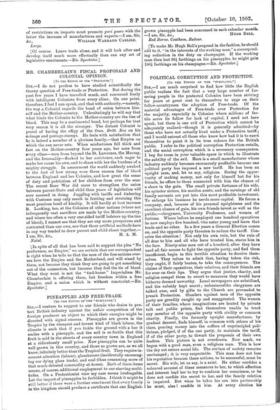MR. CHAMBERLAIN'S FISCAL PROPOSALS AND COLONIAL OPINION.
[TO THE EDITOR OF THE " SPECTATOR."J
Sia,—I do not profess to have studied scientifically the thorny question of Free-trade or Protection. But during the past few years I have travelled much, and conversed freely with intelligent Colonists from every clime. On one point, therefore, I feel I can speak, and that with authority,—namely, the way a Colonial regards the bond of union between him- self and the Mother-country. Unhesitatingly he will say that what binds the Colonies to the Mother-country are the ties of blood. This may be a sentimental bond, but perhaps for that very reason it is all the stronger. The distant Colonist is proud of having the effigy of the Omn. Britt. Rex on his coinage and postage-stamps. He feels with satisfaction that he is indeed a member• of a glorious family,—that Empire on which the sun never sets. When misfortunes fell thick and fast on the Mother-country four years ago, her sons from every clime—men from beyond the St. Lawrence, the Murray, and the Irrawaddy—flocked to her assistance, each eager to make her cause his own, and to share with her the burdens of a mighty struggle. In amazement the world suddenly awaked to the fact of how strong were these unseen ties of blood between England and her• Colonies, and how great the sense of duty and patriotism of her children from over• the seas. The recent Boer War did more to strengthen the union between parent-State and child than years of legislation will ever succeed in doing. Juggling with tariffs and tinkering with Customs may only result in fretting and straining this most precious bond of kinship. It will hardly at best increase it. Looking, too, at the Colonies of other nations (where not infrequently vast sacrifices are made by the Mother-country, and where too often a very one-sided tariff bolsters up the ties of blood), I cannot see that they are any more prosperous and contented than our own, nor that these artificial methods have in any way tended to draw parent and child closer together.—
[In spite of all that has been said to support the plea "No preference, no Empire," we are certain that our correspondent is right when he tells us that the men of the free nations over- sea love the Empire and the Motherland, and will stand by them, not because they think they are going to get something out of the connection, but because they feel the tie of blood. What they want is not the "tied-house" Imperialism Mr. Chamberlain is offering them, but freedom within a free Empire, and a union which is without constraint. —En. Spectator.]














































 Previous page
Previous page